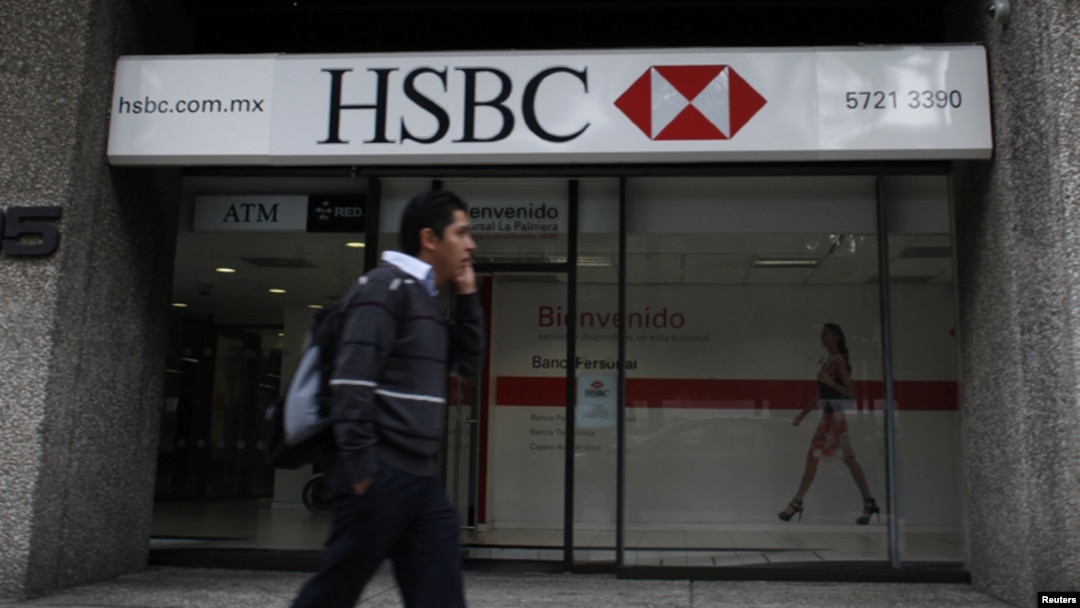U.S. banking officials are facing questions from Capitol Hill this week over allegations that Britain's largest financial institution helped global clients avoid taxes and hide hundreds of millions of dollars in assets.
Congressional committes are expected to look deeper into the revelation of 106,000 hidden accounts at the Swiss subsidiary of the British-based HSBC Holding Plc and what the U.S. is doing regarding Americans involved.
The International Consortium of Investigative Journalists (ICIJ) and several news organizations obtained bank documents dating back to 2007 that reveal the scope of the tax dodging.
The leaked documents contain details about more than 100,000 clients from around the world - both individuals and legal entities.
According to the ICIJ report, academic studies estimate that $7.6 trillion is held in overseas tax heavens, preventing governments from collecting about $200 billion a year in tax revenues.
Tough questions are likely to be raised by U.S. Congress representatives as to why the U.S. government has not been more aggressive in hunting down alleged tax cheats, analysts say.
The United States, along with Belgium, Argentina, India, and others, are said to be investigating the massive bank.
Past scrutiny
HSBC has in the past faced scrutiny from U.S. authorities.
In December 2012, the bank paid a $1.9 billion fine to settle a U.S. Justice Department case in which HSBC and its subsidiaries had been accused of enabling Mexican drug lords to launder billions and assisting clients to violate U.S. sanctions prohibiting financial activity with Iran, Sudan, and Cuba.
The settlement, which came six months after a U.S. Senate investigation into HSBC, did not involve the question of the bank’s Swiss operations helping to facilitate tax evasion currently under scrutiny.
The U.S. pursuit of HSBC and its hidden account holders, and ones held by other multinational banks, was bolstered with the July 2014 onset of a new law, the Foreign Account Taxpayer Compliance Act. The law, known by its acronym FATCA, requires foreign banks everywhere to report to the U.S. any accounts held by U.S. citizens and residents.
Still, there appear to be loopholes enabling tax evasion, analysts say.
“FATCA is definitely a huge step towards addressing the problem, but can't single-handedly stamp out tax evasion,” said Joshua Simmons, policy counsel with the transparency and good governance group Global Financial Integrity.
“Although it will lead to banks automatically sharing information like that released in the HSBC files, if the bank doesn't know who its client is, then it won't be able to disclose it,” Simmons said. “There are still ways to hide your identity, by far the most common of which is the use of anonymous companies, which we believe FATCA does not take a strong enough step towards.”
Outrage
In Britain, the report outraged lawmakers and sparked criticism that tax authorities had failed to penalize tax evaders.
“I just don’t think the tax authorities have been strong enough, assertive enough, brave enough, [and] tough enough in securing for the British taxpayer the monies that are due,” said British Parliament member Margaret Hodge.
Meanwhile, Reuters reports that a Belgian court is considering issuing arrest warrants in conjunction with an investigation of HSBC’s Swiss banking operations and alleged fraud.
“The bank is not giving the required information voluntarily,” a Belgian court spokesman told Reuters. “The judge has said that if it’s so hard to get the information [demanded by the court], he’s considering international arrest warrants for the present [HSBC] directors in Belgium as well as Switzerland.”
India’s Finance Minister Arun Jaitley announced Monday that a probe into Indian account holders at HSBC is underway, saying that New Delhi has begun the prosecution of 60 Indian HSBC account holders.
An Indian Express reports says that 1,195 names of Indian nationals are on the HSBC leaked account list, which was provided to New Delhi by France in 2011. Jaitley said most of the new names are already known by Indian authorities.
HSBC responded to the report by saying its compliance efforts have been insufficient. The bank said it has undergone a "radical transformation" in recent years and now enforces more stringent reporting requirements.
“We acknowledge and are accountable for past compliance and control failures,” the bank said in a statement. “Major regulatory reform is underway in numerous jurisdictions to ensure… that in the near future, an individual wishing to hide assets from tax authorities will be unable to do so [through HSBC]. HSBC fully welcomes and supports these reforms.”
The bank said that in 2007, its Swiss private bank operations had 30,412 accounts, but by the end of 2014, that number was cut to 10,343. The value of those remaining accounts represents more than $68.5 billion, analysts say.


